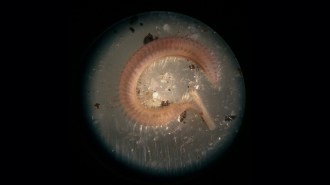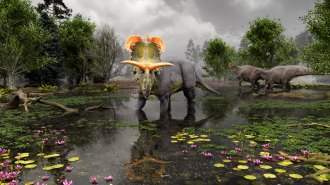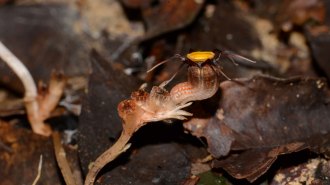All Stories
-
 Animals
AnimalsBeneficial bacteria help these marine worms survive extreme cold
Three species of marine worms living in Antarctic waters have beneficial relationships with bacteria that produce antifreeze proteins.
-
 Archaeology
ArchaeologyA new study challenges the idea that Rapa Nui islanders caused an ‘ecocide’
Rapa Niu islanders farmed and fished enough to feed only a few thousand people, too few to decimate society before Europeans arrived, researchers contend.
By Bruce Bower -
 Climate
ClimateA heat dome is baking the United States. Here’s why that’s so dangerous
As climate change makes heat waves more frequent and intense, older adults, pregnant people and others are at higher risk for heat-related symptoms.
-
 Neuroscience
NeurosciencePain may take different pathways in men and women
Sex differences in the function of nerve cells in mice, monkeys and humans suggest a new way to treat pain conditions.
By Claire Yuan -
 Animals
AnimalsCan leeches leap? New video may help answer that debate
For some, it’s the stuff of nightmares. But a grad student’s serendipitous cell phone video might resolve a long-running debate over leech acrobatics.
By Susan Milius -
 Paleontology
PaleontologyMeet Lokiceratops, a newly discovered species of horned dinosaur
Found in Montana’s badlands, Lokiceratops had two large, bladelike horns jutting forward and out from between its eyes.
-
 Space
SpaceAstronomers watch a supermassive black hole turn on for the first time
A galaxy transitioned from being dim and quiet to bright and active, giving astronomers insight into active galactic nuclei.
By Adam Mann -
 Science & Society
Science & Society‘After 1177 B.C.’ describes how societies fared when the Bronze Age ended
Archaeologist Eric H. Cline’s new book reconstructs ancient examples of societal resilience and fragility that have modern-day relevance.
By Bruce Bower -
 Earth
Earth50 years ago, the sun’s influence on Earth’s lightning was revealed
The solar wind and sunspots seem to give lightning a boost. But exactly how solar activity stimulates strikes is an enduring mystery.
-
 Health & Medicine
Health & MedicineAI could take medical imaging to the next level
Artificial intelligence in medical imaging is taking off. Experts share what they see as the promise — and potential pitfalls — of AI technology.
By Meghan Rosen -
 Plants
PlantsThis tentacled, parasitic ‘fairy lantern’ plant is new to science
The bizarre new plant from Malaysia parasitizes subterranean fungi and only briefly erupts from the soil to flower.
By Jake Buehler -

Celebrating the second law of thermodynamics
Editor in chief Nancy Shute talks about the history and enduring mysteries of the second law of thermodynamics.
By Nancy Shute